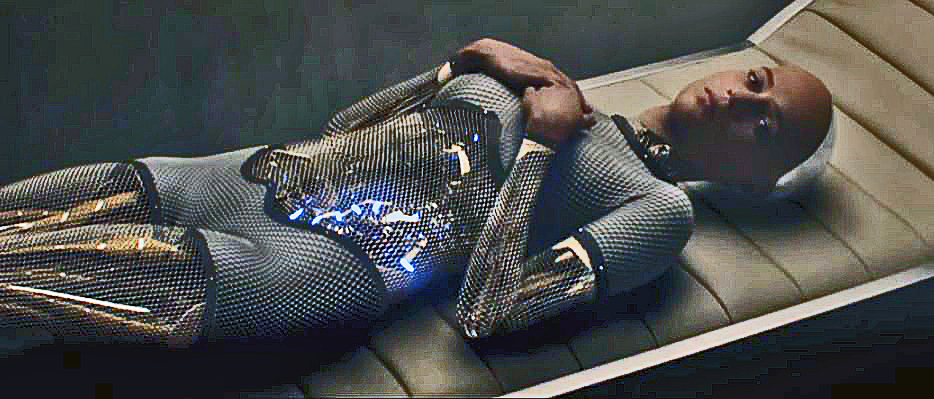Recently, Hollywood has brought artificial intelligence to the forefront: Transcendence, Big Hero 6, Her, and the upcoming Avengers: Age of Ultron. Even films such as Lucy or Rise of the Planet of the Apes, less focused on the robotic, explore humanity's reactions to alternate sources of high intelligence, reevaluating our place in nature's mental hierarchy. It'd be easy, given the current inundation, for Ex-Machina to fade into the crowd. Instead, Alex Garland's (writer of Sunshine, 28 Days Later) directorial debut succeeds by asking the right questions: can human behavior be explained through biochemistry; are our minds just evolutionary taskmasters controlling husks of flesh; does our intellect make us human...and if not, what does?
Caleb (Domnhall Gleeson) is one of Bluebook's many young programmers. The search engine giant accounts for 94% of global internet searches (Google, as of this month, is at 88%, according to StatCounter). Caleb wins a company-wide lottery to spend a week at CEO Nathan's (Oscar Isaac) mountain estate. Initially excited, he's overjoyed when Nathan gives Caleb the task of testing out his AI prototype, Ava (Alicia Vikander), to determine if she possesses true consciousness.
 Ava has a woman's face, but her metallic exoskeleton reveals otherwise. However, she isn't off-putting, like something from I Robot. Yes, the circuitry below her neck gives her face an unusual plasticity, and her limbs are clearly metal, but Ava has a sensuality that's soothing. Her structure has curves; darker panels on her chest and below the waist resemble a sports bra and shorts. It's not difficult to look past the gears, so to speak. Vikander brings the package to life; her performance transcends dialogue, presenting a wealth of naivete, curiosity, and frustration often in the span of a glance.
Ava has a woman's face, but her metallic exoskeleton reveals otherwise. However, she isn't off-putting, like something from I Robot. Yes, the circuitry below her neck gives her face an unusual plasticity, and her limbs are clearly metal, but Ava has a sensuality that's soothing. Her structure has curves; darker panels on her chest and below the waist resemble a sports bra and shorts. It's not difficult to look past the gears, so to speak. Vikander brings the package to life; her performance transcends dialogue, presenting a wealth of naivete, curiosity, and frustration often in the span of a glance.
Resembling Pinocchio more than the HAL-9000, she is less a god and more a child, attempting to deduce sensation from its dictionary entry. Nathan asks Caleb if he thinks Ava simulates the behavior of liking him, or actually does. With Caleb's puzzled pause, the film suggests this is the final hurdle, the determining factor for artificial intelligence: the ability to identify when a being can tie the abstract to the concrete, the word to the concept. Hardly a revolutionary revelation, but one left to be conclusively resolved, one that needs to be at the forefront of the conversation.
Some may find Ex-Machina underwhelming: it doesn't explain every mechanical detail or tell the same "man v. machine" story we've been used to. Instead, Ex-Machina focuses on us, and how the advent of artificial intelligence can serve as a tool to better understand ourselves, our psyche, our evolution as a species. With each viewing, I draw more from the film, whether it be from a painting in a room, or the placement of an actress in a shot. This is a film that won't let its audience ignore its questions; it starts a dialogue, like all good cerebral thrillers do.
Thank you for reading; I'm the Man Without a Plan, signing off.

No comments:
Post a Comment